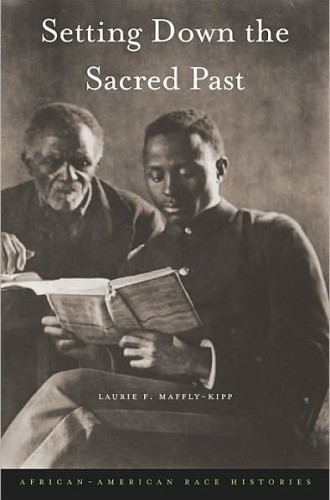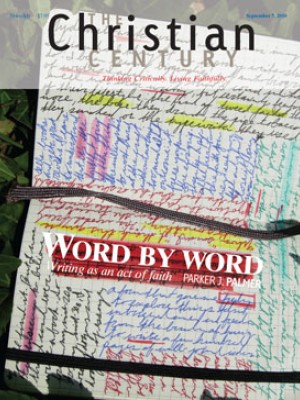Becoming African American
Amateurish historians often tell us that we must study the past to avoid repeating its mistakes. Such efforts rarely work out well. Consider the determination of the U.S. in the 1930s to avoid replicating the events of World War I or subsequent efforts to oppose communism in places like Vietnam to avoid repeating the appeasement of the 1930s.
Laurie Maffly-Kipp, by contrast, offers an unusual, complex and thoughtful approach to history. With remarkable erudition and careful analysis, she presents the lives and ideas of 19th-century African-American writers, preachers and missionaries who thought long and hard about their past.
Read our latest issue or browse back issues.
For these thinkers, history was vitally important to the present and future of their race. Faced with white scholars, ministers and politicians who speculated that God had created a separate, inferior race of dark-skinned people and told even by sympathetic whites that they had no collective history worth remembering, black Protestant leaders countered with stories of ancient African civilizations, heroes like Richard Allen and Nat Turner, and promises of a bright future as Ethiopia stretched out its hands to God.
In some cases, black Protestants turned white racial thought on its head. Proslavery apologists frequently pointed to Noah's curse of Ham's son Canaan as an explanation for the inferiority of African peoples (though the passage in Genesis 9 does not mention skin color). Black Protestants did not exactly reject the curse of Ham, partly because the narrative served as a powerful refutation of polygenesis. Instead, they pointed to the achievements of the people and nations listed as Ham's descendants as evidence for the past accomplishments and thus future potential of African peoples.
For the most part, Maffly-Kipp populates her book with figures unlikely to appear in standard accounts of 19th-century intellectual life. Jacob Oson, an early-19th-century schoolteacher at a Connecticut school for blacks, rebutted charges of African inferiority with biblical exegesis and early Christian history. Maria Stewart, a contemporary of David Walker in Boston, called on free black men to live up to the example of their fathers and grandfathers who fought for liberty under George Washington and Andrew Jackson. William Sheppard, a black Presbyterian missionary to the Belgian Congo, kept white and black audiences spellbound with colorful tales of African kingdoms.
Setting Down the Sacred Past synthesizes a great deal of what educated, Protestant African Americans thought about Africa, Haiti, Catholicism, the United States and a host of other subjects. Their thoughts were anything but monolithic. While most looked to a glorious African past, others emphasized a barbarous contemporary society in need of Protestant missions. While some black leaders advocated emigration to Haiti in the 1820s (and perhaps 8,000 relocated to the island—with mostly unfortunate results), African-American ministers eyed with suspicion Haiti's monarchy and its religious blend of Catholicism and voodoo. Emigrationists who favored removal to Africa, like Edward Blyden and Alexander Crummell, had largely given up on the United States, but others were more loyal to white denominations, and missionary agencies trumpeted a positive American role in spreading civilization and Christianity.
Out of the midst of this tremendous intellectual diversity Maffly-Kipp draws several provocative conclusions. Through the process of discovering or forging a collective past, she argues, "Africans became African Americans," even if they chose remarkably different ways of navigating their African, American and Protestant identities.
Eventually, 20th-century scholars dismissed this intellectual and religious diversity in favor of a monolithic "Negro church" or "black church," partly because the biblicist theology of Maffly-Kipp's subjects seemed archaic to more progressive black scholars and theologians. By contrast, Maffly-Kipp suggests that earlier "race authors" themselves offer a "useable past" for Americans today. If we neglect the thought of these earlier generations, she contends, we are "impoverished by forgetfulness." Recognizing the complex ways that 19th-century African Americans approached their past and present, she hopes, will help Americans move beyond simple conclusions and stereotypes about present-day black Christianity. If they were familiar with the subjects of Setting Down the Sacred Past, they might not be as shocked by figures like Jeremiah Wright.
Even more broadly, Maffly-Kipp suggests that her subjects' persistent and creative efforts to cultivate a collective past have lessons for all of us, regardless of race. The shapers of "race histories," she concludes, considered history "critically important not simply because it helps us to shape our future, but because it demonstrates how a transcendent God, one who stands outside the vicissitudes of this world, wants us to act." The knowledge of a glorious past, the example of black and white heroes of the faith, and the anticipation of a millennial future enabled black Protestants to respond to the bitter disappointments of the Civil War's aftermath with efforts to shape a more just society either in the United States or abroad. In their books and speeches, the "point of history is to rise above ourselves and this world to an unmoving vantage point."
American Protestants need this reminder. Certain religious groups in the United States, ranging from Jewish Americans to the Latter-day Saints, cultivate a strong sense of their history as a people. Maffly-Kipp shows how African-American Protestants developed that mentality in the 19th century. Certainly, history's reinforcement of group identities does not always further positive goals: Setting Down the Sacred Past also illustrates that a strong sense of collective history can reinforce tendencies toward racial essentialism and exclusion.
Still, as a result of the flattening of denominational identities and the growth of nondenominational churches and movements, many American Protestants are impoverished by historical forgetfulness because their connection to the "great cloud of witnesses" who came before them is ever more attenuated. In our fragmented society, it is probably hard for many of us to conceive of broad collective identities. Should we maintain a sense of ourselves as Methodists, as Protestants or as Americans? Many of the figures that Maffly-Kipp profiles cultivated all of these identities and more. They were committed Methodists, avowed Protestants and sometimes fervent and sometimes ambivalent Americans—as well as dedicated race leaders. They knew that they needed a shared sacred past as a foundation for a better common future. So do we all.






